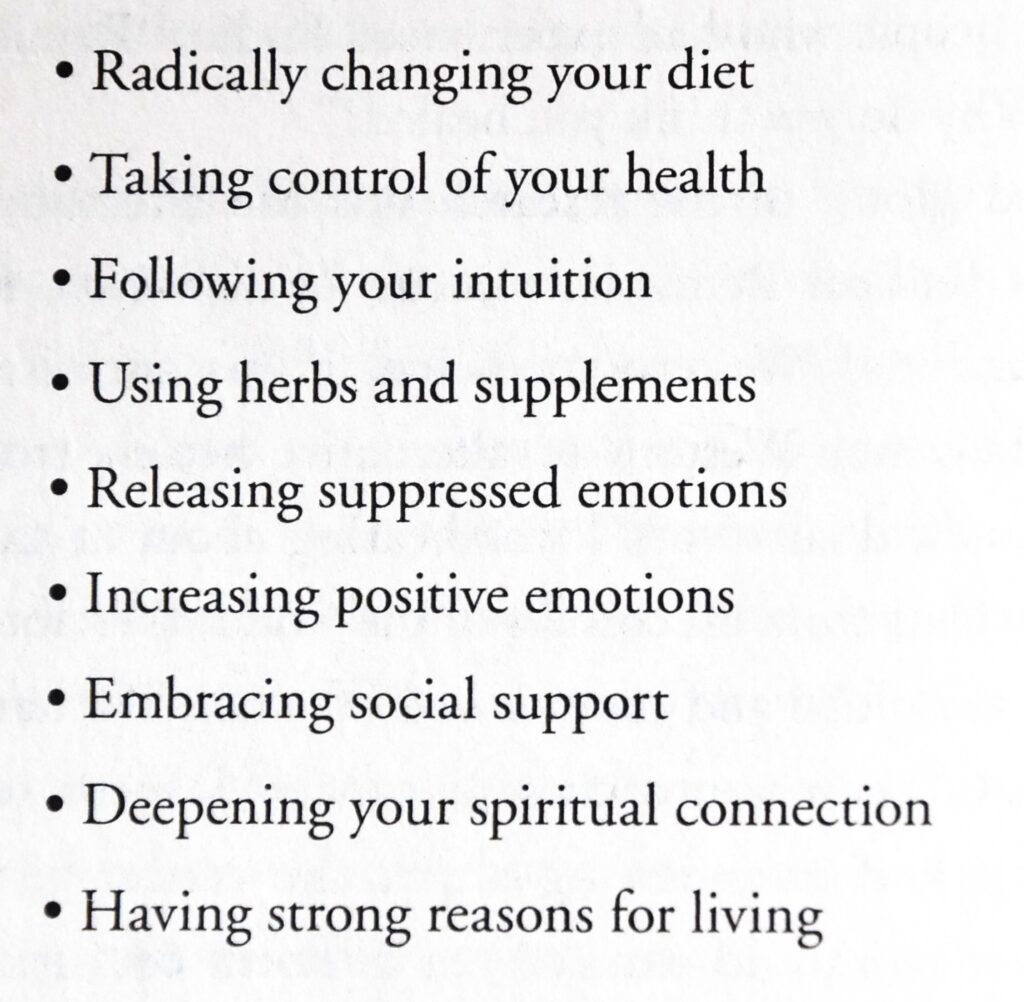This includes both “hard” and “soft” things/items. But it does make me wonder if some of this is simply attitude towards life. Like religion, music, art, food, etc., it is in the mind of the beholder?
And for some reason I have gotten myself turned around to look at my glass half full, not half empty. Being grateful, on an ongoing basis, is just so great! Probably what has helped is being on this side of many “bumps”, realizing there are always something positive in every negative if I am smart enough to take the time to get the understanding that the positive is there. Also see PERSONAL BELIEFS and OBSERATIONS.
Regularly being GRATEFUL can be a powerful mindset. As well as LOVING KINDNESS can be.
And looking back at the RADICAL REMISSON book are the nine key factors:

And not to be forgotten is that good medicine of sleep. As Aric A. Prather, PhD, stated in his THE SLEEP PRESCRIPTION: “Sleep is an amazing medicine. It’s so potent, it can help with any number of the ills that plague us….science is showing us just how true that is. Good sleep boosts the immune system. It regulates metabolism. It makes you happier. It makes you a better, more empathetic partner and a more patient parent. It can improve your productivity and creativity at work and boost your energy so you can actually squeeze in that extra (or first) workout during the week……sharpens the mid and can actually clear toxins out of the brain.“(p xxi)
Skipping or interrupting sleep cycles, which happens more under stress, reduces the ability to clear out the metabolic waste that would leave us feeling alert and refreshed. (p56)
Do you want to be in a fight or fight mode? No. But challenging stress is great for your system. When we experience “peak and recovery” stress–where your acute stress response turns on, but then you recover quickly and your system goes back to baseline–it’s actually healthy for your body at the cellular level…. And has an energizing effect–when viewed as a challenge and not a threat. ( p63)
Using just our thoughts, we can time travel-travel into the past or future, reliving or rewriting events that have already occurred, inventing various scenarios and filling them with vivid sensory detail. It’s an amazing capacity we have. And it’s at the root of a a lot of our success as a species. But all wrapped up in that nice package of evolutionary advantages are some downsides: worry, anxiety, rumination. Because we’re so great at these “virtual reality” simulations of the past and the possible future, we can get wrapped up in thought patterns that keep us focused on problems we have no capacity to change…… We drive up our own stress levels, for no reason at all, and with no associated benefit. We are really, really good at this. (p 65)
We’re social by nature–even the introverts–and we’re very sensitive and susceptible to interpersonal slights. (p 70)
Why are some people naturally more ruminative than others? There’s a whole cornucopia of factors. But there is also incredible neuroplasticity in the human brain.(p 71)
Our own mind can be the problem. To get off the rumination track use “cloud watching” or “trained spotting”; watching thoughts arrive and depart. Set aside a worry time in the evening before going to bed, not necessarily looking for a solution but just going over what the worries are so you can mentally put them aside when you go to bed. Another method is to write down the problem and the solution during the daytime and put it by the bed. If you think of it during the night, refer to what you wrote so you don’t need to address it further then. Distraction can be a powerful sleep aid; so can progressive muscle relaxation, visualizing and/or focus on sensory details of a serene place.
To be added are some pretty photos in my enjoyment of well-being and flourishing.
